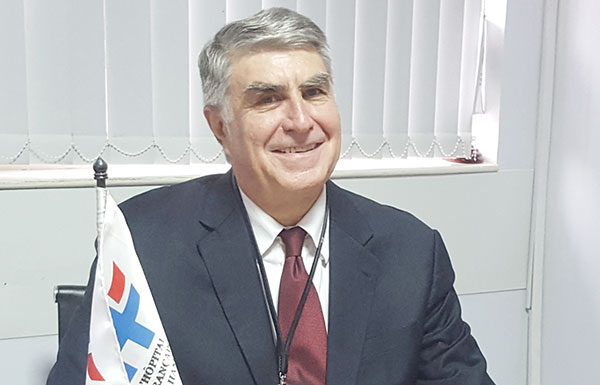Hanoi French Hospital: of success and hardship
 |
| Lucien Blanchard, general manager of Hanoi French Hospital |
Before working as general manager of Hanoi French Hospital (HFH), you worked as a hotel manager. What aroused your interest in HFH? What are the differences between the concepts of hospital management and hotel management?
I spent over 30 years in the hotel industry and 17 years in Asia. I arrived in Vietnam in 1997 and started running a newly-built hotel in Hanoi as its general manager. At that time HFH and my hotel had a corporate contract to provide accommodation to French doctors who came to work for the hospital. One of the first customers was the future owner of HFH.
In 2002, I was proposed by this gentleman to join HFH as general manager. One of the first strategies I decided to apply to HFH was the employment of the hotel-hospital integration concept.
The differences between customers differentiate the corporate business management. Customers coming to hotels (the guests) go on their own volition, while those going to hospitals (majorly patients) must do so due to health conditions or accidents.
However, in terms of management concept, there is a common objective for the hotel and hospital industries. That is, both need to set out a vision and values to satisfy and delight customers.
Vietnam is home to many prestigious hospitals. Which factors elevated HFH over competitors, to be recognised as one of the leading integrated healthcare providers in the North.
Thanks to the Boutique hotel-hospital integration concept, our hospital has been set up in the hotel style to bring a cosy atmosphere to our customers/patients.
In addition, several of our associates have experience in working with hotels in positions like Customer Services Manager, Hotel Services Manager, and Financial Controller (capitals needed?). They help the hospital to provide services similar to ones in the hotel industry: central reservation, housekeeping services, and food delivery.
We have been working closely with the Vietnam National Institute for Productivity and one of the cooperation programmes between us was piloting the Lean 6 Sigma (LSS), which has brought about excellent results: it reduced waiting times, shortened/simplified procedures, and eliminated most waste. As a result, we were granted the “EXCELLENCE AWARD” for the most Improved Local Hospital by the ASIAN Hospital Management Awards.
Lean 6 Sigma is currently the most advanced quality management and improvement method in the world. Therefore, we plan to keep it in our core business activities. Besides, we are also applying several other tools, like the Pareto principle, Ishikawa diagram, etc.
Amid the growing competitiveness, do you have any plans for implementing a new hospital management concept? What investment plans does HFH have to strengthen its position in Vietnam?
We are implementing our project to renovate and expand HFH. Our new hospital will triple in scale, with 170 beds and 20 daycare beds, when the new facility starts operation in early 2019.
We are going to make large investments to purchase state-of-the-art equipment and we strongly believe that our hospital will become one of the most high-tech and elegant healthcare facilities in Vietnam.
In addition, we are now establishing a bank of talent, setting up a programme for employee development.
Besides, we have been observing the development of the healthcare sector in several countries in the region, such as Singapore and Thailand. Their benchmarks are what we are striving for to further promote our brand name. In my opinion, competition is always healthy. Where competition exists, the quality will be improved. Therefore, to strengthen our position and meet customers’ demands, there is no other way but to continuously improve our service quality.
Having been working in Vietnam for so long, what is your most unforgettable memory at HFH?
The pandemonium of the SARS outbreak, without a doubt. I started working in HFH in September 2002 and the SARS came just five months after my arrival. It was a difficult period for me, for the management, and for all associates. At the time, hardly any customers came to the hospital for examination, they were even scared of passing by the building. The hospital was completely isolated. We then had to decide to close down for six months. I was really impressed by the efforts of every individual working for HFH, by the collective solidarity shown by our colleagues. All associates stood together to fight against SARS and we were able to reopen HFH within six months, in August 2003. That was a defining event for the development of the hospital, I suppose.
What the stars mean:
★ Poor ★ ★ Promising ★★★ Good ★★★★ Very good ★★★★★ Exceptional
Latest News
More News
- Businesses ramp up production as year-end orders surge (December 30, 2025 | 10:05)
- Vietjet chairwoman awarded Labour Hero title (December 29, 2025 | 13:06)
- How to unlock ESG value through green innovation (December 29, 2025 | 10:03)
- AI reshapes media and advertising industry (December 29, 2025 | 08:33)
- FPT and GELEX sign deal to develop blockchain tech for global markets (December 29, 2025 | 08:29)
- Vietnam’s GDP forecast to grow by 9 per cent in 2026 (December 29, 2025 | 08:29)
- Women entrepreneurs are key to Vietnam’s economic growth (December 29, 2025 | 08:00)
- Vietnam's top 500 value-creating enterprises announced (December 27, 2025 | 08:00)
- The PAN Group shaping a better future with ESG strategy (December 26, 2025 | 09:00)
- Masan Consumer officially lists on HSX, marking the next phase of value creation (December 25, 2025 | 13:20)

















 Mobile Version
Mobile Version